
Virtual Conference Series on Global National Park Management
Theme: Global National Park in the New Normal: Challenges and Opportunities
Organizers: National Park Research Centre, Faculty of Forestry, University of British Columbia
National Park Research Centre, Beijing Forestry University
Sponsor: The Asia-Pacific Network for Sustainable Forest Management and Rehabilitation
For decades, studies have highlighted the connection between national parks and human wellness. The recent global pandemic has enhanced this connection, as populations worldwide are increasing their dependence on national parks to address the physical and mental impacts of Covid-19. However, the pandemic has also resulted in temporary access restrictions to parks and protected areas in order to mitigate disease transmission. These trends have important consequences for park management, including the diminishment of park resources and staff, the suspension of management and restoration programs, and an elevated public appreciation for parks. As parks reopen, it is important for relevant decision-makers to anticipate the short and long-term impacts of Covid-19.
While the global pandemic has presented protected areas with many new challenges, it has also provided us with opportunities to strengthen management strategies. The UBC National Park Research Centre would like to invite the world’s leading park experts to discuss the importance of our parks and to address the short and long-term pandemic impacts.
Theme: National Park in the New Normal: Challenges and Opportunities
Participants: ~100
I hour (45 minutes’ talk and 15 minutes’ Q&A)
Time: Each Friday evening (Vancouver time)
Time: Each Saturday Morning (in Asia)
Please see the lecture posters below for more information.
Lecture #25: Canada’s Net Zero Challenge: Concerned Citizens Making Impact
April 8th, 4:00 – 5:00 pm (Vancouver Time), April 9th, 7:00 – 8:00 am (Beijing Time), 2022
Keynote Speaker: Dr. Charles Lin, Harvard University
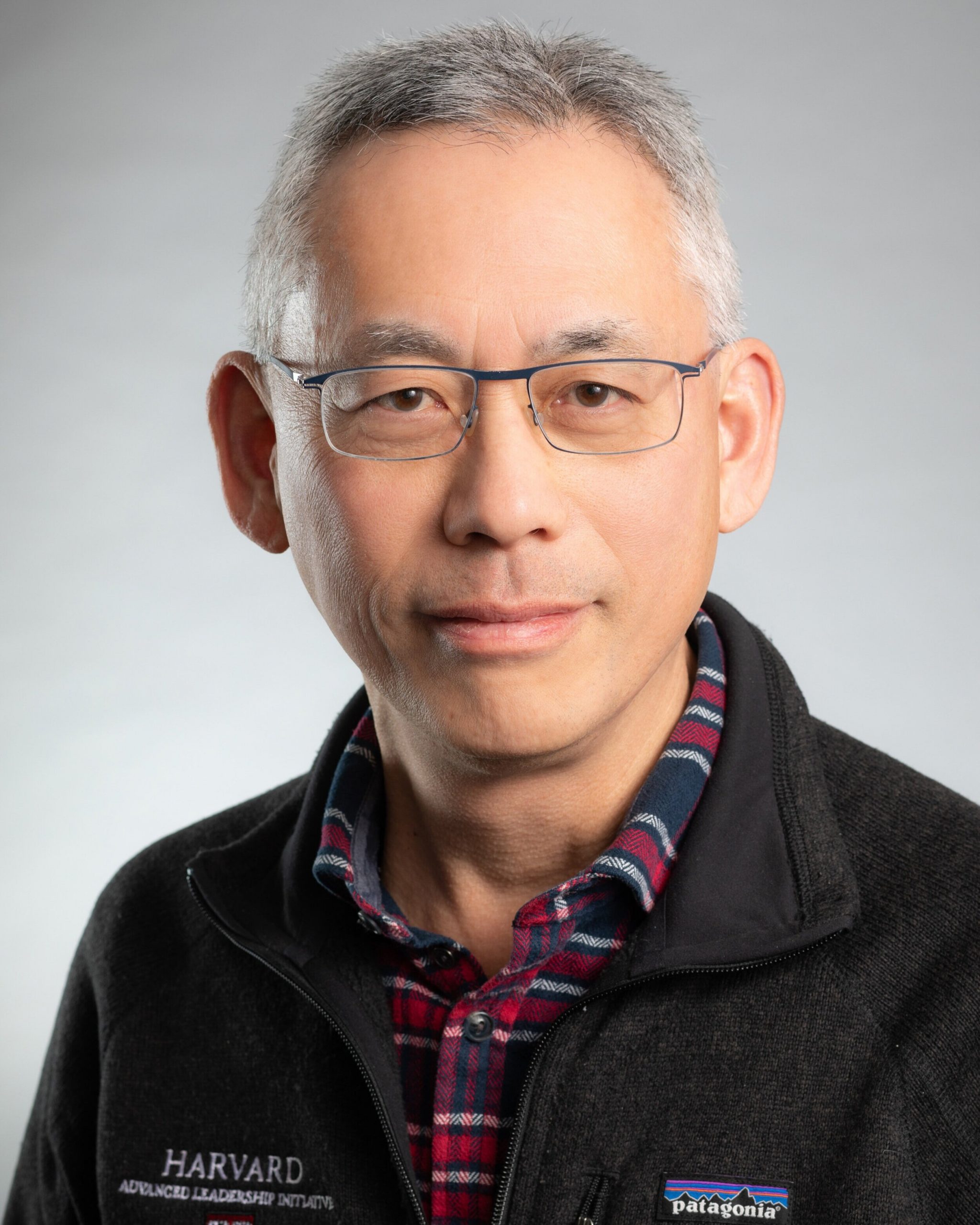 |
Charles Lin is the founder and lead of Impact Net Zero (https://impactnetzero.ca/), an outreach initiative on climate change and energy transition aimed at the Canadian public. In 2019, Charles was a Fellow of the Advanced Leadership Initiative of Harvard University. From 1979 to 2017, he was a professor of weather and climate science at the University of Toronto and McGill University in Canada, and a senior manager in the Canadian federal government (ECCC; Environment and Climate Change Canada) where he led ECCC’s research in weather, climate and air quality science. Charles holds a B.Sc. in Physics and Mathematics from the University of British Columbia (UBC; 1974), and a Ph.D. in Meteorology from the Massachusetts Institute of Technology (MIT; 1979). He participated as member or lead of senior Canadian delegations to the Intergovernmental Panel on Climate Change (IPCC) and the World Meteorological Organization (WMO), and published over 70 articles in refereed scientific journals in weather and climate science. |
Lecture #24: Geoparks and Geo-tourism in China: A Sustainable Approach to Geo-conservation, Geo-education and Local Development.
April 1, 6 – 7 pm (Vancouver Time), April 2, 9-10 am (Beijing Time), 2022
Keynote Speaker: Prof. Peng, Jian, School of Management, Minzu University of China
 |
Dr. Xu has been teaching and conducting research in the fields of geotourism and geoparks since 2002. She had done research in the University of Manitoba of Canada as a visiting scholar from September 2010 to September 2011. She has broad interests in developing practical applications of geotourism, interpretation and education for geoparks. She has worked and cooperated for more than 40 geoparks in China, South Korea, Spain, Canada, UK, Myanmar, Mexico, etc. She is a coordinator of Xingwen UNESCO Global Geopark, China and a consultant of Sanqingshan UNESCO Global Geopark, China and Wudalianchi UNESCO Global Geopark, China. Her books about the geoparks were awarded as “Excellent Science Popularization Books” by the Ministry of Land and Resources of the People’s Republic of China in 2016, 2017, and b the Ministry of Natural Resources of the People’s Republic of China in 2018. |
Lecture #23: Data Science and Data-Centric AI
March 11, 4 – 5 pm (Vancouver Time), 2022
Keynote Speaker: Mr. Jieyu Zhang, School of Computer Science, University of Washington
 |
Mr. Jieyu is a second-year PhD student in Computer Science at the University of Washington, Seattle. Before that, he was an undergraduate student in Computer Science of the University of Illinois Urbana-Champaign. Mr. Jieyu’s current research interests are Data Management for Machine Learning and Weak Supervision (check out this survey repo and this benchmark to learn more about Weak Supervision) with an emphasis on effort-light approach. His ultimate goal is to build an effective, efficient and explainable system to facilitate new machine learning tasks by leveraging knowledge in the form of heuristics, labels and trained models. His past explorations lay in the intersection of data mining, machine learning and natural language processing. |
Lecture #22: Factors limiting the potential of tourism as an alternative livelihood for local residents in national parks of China
March 25, 6 – 7 pm (Vancouver Time), March 26, 9-10 am (Beijing Time), 2022
Keynote Speaker: Prof. Peng, Jian, School of Management, Minzu University of China
 |
Prof. Jian Peng is a professor at the School of Management, Minzu University of China, doctoral tutor, and director of the Ethnic Tourism Research Center. He got his Ph.D. in Geography from Peking University, was a Postdoctoral Fellow of China Tourism Academy, Visiting Scholar in the Department of Parks, Recreation and Tourism Management of Clemson University and the Department of Recreation, Parks and Tourism Science of Texas A&M University. He is a committee member of multiple academic and professional associations. His research focuses on national park management and tourism sustainable development. He has hosted or participated in more than 20 fund and planning projects published more than 70 papers in academic journals and edited 8 academic books. |
Lecture #21: People and Biodiversity in Asia’s Forests in the 21st Century
February, 5 – 6 pm (Vancouver Time), February 19, 9-10 am (Beijing Time), 2022
Keynote Speaker: Prof. Jeff Sayer, Faculty of Forestry, Department of Forest and Conservation Science, University of British Columbia
 |
Prof. Jeff Sayer is a British ecologist who began his career working on conservation programs in many African and Asian countries. He directed the tropical forest conservation program at IUCN. In 1993, he was appointed founding director-general of CIFOR which allowed him to live in Indonesia for the following 9 years. He was a Professor of Conservation and Development at James Cook University in Cairns, Australia. He has focused on the conservation and development problems of tropical moist forests in the Congo Basin and South-East Asia. As a professor at UBC, he is interested in Integrated approaches to natural resources management, landscape approaches, and integrating science into ngsher natural resources decision making. |
Lecture #20: Geoheritage In the United States
April 23, 5-6 pm (Vancouver Time), April 24, 8-9 am (Beijing Time), 2021
Keynote Speaker: Dr. Thomas Casadevall. U.S. Geological Survey
 |
From 1996 through 2008, Tom served in the Office of the Director, USGS with terms as Regional Director for the Western Region (1996-1997), as Acting Director of the USGS (1998), as Deputy Director (1999-2000), and as Regional Director, Central Region (2000-2008). From 1978 to 1996, he worked as a geologist with the USGS Volcano Hazards Program, stationed at the Hawaiian Volcano Observatory, the Cascades Volcano Observatory, the Alaskan Volcano Observatory, and in Denver, Colorado. From 1989 through 1996 he led the USGS project “Volcanic Hazards and Aviation Safety”. From 1985 through 1988 he was an Advisory Volcanologist to the Volcanological Survey of Indonesia and resided in Java, Indonesia. In 1977-1978 he taught geology of volcanic environments at the Escuela Politecnica Nacional in Quito, Ecuador. From 1969-1972 he worked as a mineral exploration geologist with Bear Creek Mining Company and from 1972 and 1974 as a production geologist for the Sunnyside gold mine, Silverton, Colorado.
Thomas Casadevall’s scientific interests focus on mineral resources related to volcanic environments; on active volcanism and the related hazards to people and aviation operations, and on geologic heritage with an emphasis on protected volcanic landscapes. He currently leads the US Geoheritage and Geoparks Advisory Group and recently completed the report “World Heritage Volcanoes” for the IUCN (International Union for the Conservation of Nature).
https://portals.iucn.org/library/sites/library/files/documents/2019-020-En.pdf
Tom is a member of the IUCN’s World Commission on Protected Areas and its Geoheritage Specialist Group, and a member of the “Working Group Geoheritage Assessment” of the IUGS’s International Commission on Geoheritage. |
Lecture #19: Singapore’s National Park during the pandemic and beyond
Keynote speaker: Ms. Sophianne Araib
Group Director, National Parks Board, Singapore
April 9, 6-7 pm (Vancouver time), April 10, 9-10 am (Beijing time)
 |
Sophianne is the Group Director of Parks and Group Director of Corporate Strategy and Planning at the National Parks Board (NParks), Singapore. A Statutory Board of Singapore’s Ministry of National Development, NParks is the lead government agency for greenery, biodiversity conservation, wildlife and animal health as well as animal welfare and management.
As the Group Director of the Parks Division, Sophianne is responsible for the management and programming of all Parks located in Singapore’s Central Region. Her Parks management work also involves collaborating closely and engaging with diverse stakeholders that include other government agencies, industry partners and the community to provide excellent recreational opportunities and experiences in the parks as well as foster greater stewardship of our parks and green spaces.
As the Group Director of NParks’ Corporate Strategy and Planning Division, Sophianne is responsible for driving and facilitating the development of corporate strategies and policy reviews to ensure NParks remains effective and relevant. The Division is also responsible for the coordination and effective implementation of NParks’ risk management framework and management of major incidents and crises. |
Lecture #18: The 30 years of Post-Iron Curtain transboundary cooperation in conservation
March 19, 8-9 am (Vancouver time), March 19, 4-5pm (Brno, Czech Republic time), March 19, 11:00-12:00pm (Beijing time)
Keynote Speaker: Dr. Zdenka Křenová
Department of Biodiversity, Global Change Research Institute, Czech Academy of Science
 |
Zdenka Křenová received her Ph.D. in population biology of endangered species from the University of South Bohemia in 2001. In 2003, she worked as a post-doc position at UCLA, California, USA. Together with Prof. Rudi Mattoni from UCLA and his colleagues, she involved in conservation projects focusing on Palos Verdes Blue Butterfly, an endemic species of LA County.
In the years 2004-2010, she worked for the Šumava National Park Administration as a Head of Department of Research and Nature Protection and has served as Deputy Director of NP from May 2007.
Since 2012, she is a member of the Department of Biodiversity, Global Change Research Institute, Czech Academy of Science. At the same time, she is teaching several conservation biology courses at the Charles University in Prague and the University of South Bohemia in České Budějovice.
Her research is focused on conservation biology, management of protected areas and rare species, biodiversity and climate change. She is a Natura 2000 expert and interested in wilderness conservation and management. She has published many peer-reviewed articles on transboundary conservation.
Dr. Zdenka Křenová
Department of Biodiversity, Global Change Research Institute, Czech Academy of Science. in 2003, she worked in a post-doc position at UCLA, California, USA. Together with Prof. Rudi Mattoni from UCLA. In the years 2004-2010, she worked for the Šumava National Park Administration as a Head of Department of Research and Nature Protection and has served as Deputy Director of NP from May 2007. Since 2012, she is a member of the Department of Biodiversity, Global Change Research Institute, Czech Academy of Science. At the same time, she is teaching several conservation biology courses at the Charles University in Prague and the University of South Bohemia in České Budějovice. |
Lecture #17: Divergent Evolution of the National Parks Concept: The Case of the Australian Anomaly
Febuary 5, 5:00-6:00pm Vancouver time (Feb 6, 9:00-10:00am, Beijing Time | Feb 6, 12:00-1:00pm, Australia Time)
Keynote Speaker: Dr. Warwick Frost
Professor of Tourism, Heritage and the Media, School of Business, La Trobe University, Melbourne, Australia
 |
Dr. Warwick Frost is Professor of Tourism, Heritage and the Media in the School of Business, La Trobe University, Melbourne, Australia. Originally a researcher in environmental history, his work has extended to encompass national parks, ecotourism, zoos and cultural heritage tourism. His books include National Parks and Tourism: International Perspectives on Development, Histories and Change (co-edited with C. Michael Hall, Routledge, 2009), Zoos and Tourism: Conservation, Education, Entertainment? (Channel View, 2011), Imagining the American West through Films and Travel (co-written with Jennifer Laing, Routledge, 2015) and An Environmental History of Australian Rainforests until 1939: Fire, Rain, Settlers and Conservation (Routledge, 2021). He is also Co-Editor-in-Chief of The Journal of Heritage Tourism. |
Lecture #16: National Park in the COVID-19 World: Challenges and Opportunities — A case study from Yellowstone National Park
January 22, 5:00-6:00 pm Vancouver time (January 23, 9:00-10:00 am, Beijing Time)
Keynote Speaker: Dr. Guangyu Wang
Associate Dean, Asian Strategies, Ph.D., M.B.A, Faculty of Forestry, University of British Columbia
 |
Dr. Guangyu Wang’s current research is focused on sustainable forest management and integrated watershed management by using GIS and computer modeling. He has completed several research projects on watershed scale forest restoration and sustainable development projects, where he has used system dynamic approaches, bioregional assessments, geography information systems (GIS), and satellite remote sensing (SRS) techniques to analyze the mechanisms of ecosystem degradation and model the all over land use management. A computerized optimized model has been developed to define the parameters of water quality and quantity, soil erosion and productivity, biodiversity, and societal satisfaction in order to estimate the result of various applications of land use patterns, silvicultural systems, and forest practice techniques in the watershed.
Dr. Guangyu Wang has worked intensively in national park development in the USA, Canada, and China, while he has published several peer-review papers on national park development. During 1993-1997, he served as Director for Fuzhou National Park, one of the top ten national forest parks in China during that time. He is an Adjunct Professor for four major forestry universities in Mainland China and an honorable professor at National Taiwan Normal University. He also worked at the US Forest Services, Pacific Northwest Regional Office and the World Forestry Institute. Dr. Wang served as a technical leader for 36 key forestry projects and received seven National Science and Technology Progress Achievement Awards.
As a business professional for many years in China and the US, he is also interested in strategic planning, financial management, marketing promotion, and project management. He has successfully completed several marketing, investment and development projects, and initiated several promotional events for multi-national forestry companies entering China’s market.
|
Lecture #15: Monitoring the Vital Signs of America’s National Parks
January 8, 2021 Friday, 5:00-6:00pm, Vancouver Time (January 9, 2021 Saturday, 9:00-10:00am, Beijing Time)
Keynote Speaker: Dr. Gary E. Davis
 |
Dr. Gary Davis has been studying nature and people since he joined National Park Services as a national park ranger, research scientist, ocean explorer-aquanaut, and photographer. He co-edits The Photographer’s Frame, a regular visual-essay feature of Parks Stewardship Forum, a journal of the University of California Berkeley’s Parks, People and Biodiversity Institute and the George Wright Society. Gary explored and documented the ecological health of America’s national parks by developing protocols for measuring park vital signs, and demonstrated the positive effects of protecting marine life, making national parks safer for fish.
During his career of ecological research in national parks, from the Virgin Islands and South Florida’s Everglades, Dry Tortugas, and Biscayne national parks to California’s Channel Islands National Park, he realized that translating science into illustrated stories was critical to gain support for effective conservation. This epiphany in 2007 motivated his endeavors of world travel with National Geographic Society explorers and photographers to learn the art of visual essays.
Recently, he has served on the boards of the Western National Parks Association and the SeaDoc Society at the University of California, Davis, Wildlife Health Center. He has also advised the U. S. Departments of Commerce and Interior as a member of the Marine Protected Area Federal Advisory Committee and of the National Park System Advisory Board’s Science Committee. Formerly, Gary held a variety of board positions with the George Wright Society including President, Vice President, and Treasurer. |
Lecture #14: National Park Management and Indigenous Community Engagement in Taiwan
December 11, Friday, 5:00-6:00pm Vancouver time (Dec 12, Saturday 9:00-10:00am, Beijing Time)
Keynote Speaker: Dr. Shyue-Cherng Liaw
Professor and Associate Dean, College of Liberal Arts, National Taiwan Normal University
 |
Prof. Shyue-Cherng Liaw graduated from the National Taiwan University, Dept. of Forestry for BS and MS degrees in Taiwan. He got a Ph.D. degree from the Colorado State Univ., Dept. of Earth Resources, USA. He had served as a senior technician in Taiwan Forestry Bureau, and as an associate researcher in Taiwan Forestry Research Institute, Dept. of Watershed Management. After that, he moved to be an associate professor and professor in the Dept. of Geography, National Taiwan Normal University. He majors in natural resources management, watershed management, ecology and hydrology. Some academic courses he has taught include Watershed Management, Human Ecology, Environmental Sustainability, Natural Resources Conservation, Environment and Society. Currently, his research is related to hillslope disaster, soil and water conservation, community forestry, and natural resources management. He applies the GIS and remote sensing to study ecological hydrology, land-use change, and landslide disaster, especially for community vulnerability and resilience to natural disasters.
Register in advance for this meeting: (copy and paste the website)
https://ubc.zoom.us/meeting/register/u5IqduCsqz4sHNFAyZGvxqnRfiP-5dL2NmIZ
After registering, you will receive a confirmation email containing information about joining the meeting. |
Lecture #13: The Evolution of the American National Park System
November 27, Friday, 5:00-6:00 pm, Vancouver time (Nov 28, Saturday, 9:00-10:00 am, Beijing Time)
Keynote Speaker: Dr. Lary M. Dilsaver
Prof. Department of Earth Sciences, University of South Alabama, USA
 |
Dr. Lary Dilsaver, a native Californian, is Professor Emeritus of Historical Geography at the University of South Alabama. He also has been a researcher for the History Division of the National Park Service since 1985. During that time, he has written or edited eight books and numerous articles and book chapters on the history of the national park system and many of its units. His books include four administrative histories each of which is an analysis of a specific park’s establishment and the evolution of its management issues. The units are Sequoia and Kings Canyon National Parks with co-author William Tweed (1990 and 2nd edition 2016); Cumberland Island National Seashore (2004); Joshua Tree National Park (2016); and Channel Islands National Park (2020 with co-author Timothy Babalis). He has also edited a documentary history of the entire national park system called America’s National Park System: The Critical Documents (1995 and 2nd edition 2016). Articles have focused on the National Park Service’s international activities, landscape planning, and political geography, as well as the major events that shaped the human geography of the American West. Dr. Dilsaver has received lifetime achievement awards from the National Park Service and the American Association of Geographers. |
Lecture #12: A Century of Climate and Land-Use Change on California’s Birds and Mammals: Are Parks Doing their Job?
November 13, Friday, 5:00-6:00 pm Vancouver time (Nov 14, Saturday, 9:00-10:00 am, Beijing Time)
Keynote Speaker: Dr. Steven R. Beissinger
Professor, Department of Environmental Science, Policy & Management, UC Berkeley, USA
 |
Steven R. Beissinger is Professor of Ecology & Conservation Biology at the University of California, Berkeley, where he held the A. Starker Leopold Chair in Wildlife Biology (2003-13), and is a research associate of the Museum of Vertebrate Zoology. Professor Beissinger served as Chair of the Department of Environmental Science, Policy & Management from 2001-04, and is the co-Director of the Berkeley Institute for Parks, People and Biodiversity. Dr. Beissinger joined the faculty at Berkeley in 1996 after spending eight years as a professor at Yale University and two years as an NSF Postdoctoral Fellow at the Smithsonian Institution’s National Zoo.
Professor Beissinger’s professional career has been devoted to producing ecological knowledge that can be used to both conserve biodiversity and to uncover basic processes in behavioral and population ecology that govern how nature works. His current research centers on two of the biggest challenges facing conservation and society –wildlife responses to global change and species’ extinctions – with recent fieldwork carried out in protected areas and working landscapes in California and Latin America. He directs the Grinnell Resurvey Project – a 16 year effort to revisit locations throughout California first surveyed by Joseph Grinnell in the early 1900’s in order to quantify the impacts of a century of climate and land-use change on the birds and mammals of California. Steve’s studies of parrotlets in Venezuela extend more than 30 years and provides the longest running study of a tropical bird. Integrative studies of secretive, threatened rails in California provide a model for understanding coupled natural and human systems. He has authored over 200 scientific publications and is senior editor of three books, including Science, Conservation and National Parks (2017) and Population Viability Analysis (2002). He served on the editorial boards of Ecology Letters, Ecology, Conservation Biology, Studies in Avian Biology, and Climate Change Responses.
Steve is a Fellow of the American Association for the Advancement of Science (AAAS), the Ecological Society of America (ESA), the Wissenschaftskolleg zu Berlin (WIKO), the California Academy of Sciences, and the American Ornithological Society (AOS, formerly the American Ornithologists’ Union or AOU), which awarded him the William Brewster Memorial Award in 2010 for his research on Western Hemisphere birds. Steve served on the Board of Directors of the National Audubon Society (2002-2009), and as President-elect (2014-2016) and President of the AOU (2016) and as the inaugural President of the AOS (2016-2018). Professor Beissinger earned a B.S. (1974) and M.S. (1978) in Zoology at Miami University, and a Ph.D. (1984) in Natural Resource Ecology at the University of Michigan. |
Lecture #11: Biodiversity monitoring in national parks
October 30 Friday, 5:00-6:00 pm, Vancouver Time (October 31 Saturday, 8:00-9:00 am, Beijing Time)
Keynote Speaker: Dr. Xiaoli Sheng, Chinese Academy of Science, China
 |
Dr. Xiaoli Shen is an Associate Professor at the State Key Laboratory of Vegetation and Environmental Change, Institute of Botany, Chinese Academy of Sciences. She has served as an associate editor for Biodiversity and Conservation since 2011. She is a member of UCN Species Survival Commission Post-2020 Biodiversity Targets Task Force (2018-) and a member of CCICED (China Council for International Cooperation on Environment and Development) Special Policy Study on “Post 2020 Global Biodiversity Conservation” (2018-). Her current research focuses on conservation planning and effectiveness of protected areas, conservation and management of threatened species, and community-based conservation. She will introduce the status and progress of China’s biodiversity monitoring, with a focus on the integrated biodiversity monitoring platform in Qianjiangyuan National Park in China |
Lecture #10: Global National Park Management: Challenges and Opportunities after Covid-19
October 16, Friday, 6:00-7:00pm Vancouver time (Oct 17, 9:00-10:00am, Saturday, Beijing Time | 10:00-11:00am Japan Time)
Keynote Speaker: Prof. Mineo Kato
Graduate School of International Social Sciences, Yokohama National University, Japan
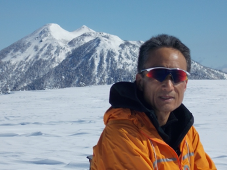 |
Dr. Mineo KATO is a professor of Environmental Law & Policy in the Graduate School of International Social Sciences, Yokohama National University (Yokohama, JAPAN). He obtained his Ph.D. & Master’s in environmental science, LL.B. from Hokkaido University, Sapporo, Japan. He has studied the social and legal (law & policy) aspect of national park & protected national parks and other protected areas for more than 40 years. He has served as an expert for Mt. Fuji World Cultural Heritage Academic Panel, Oze National Park Committee and the Chairperson of Mt. Shibutsu (in Oze National Park) Environmental Protection Committee. He has also promoted the world natural heritage sites in Japan such as Shiretoko World Natural Heritage (Hokkaido, Japan), Ogasawara World Natural Heritage, Mt. Fuji World Cultural Heritage (Shizuoka & Yamanashi, Japan). His works also included the development of Oze National Park (Gunma, Niigata, Fukushima & Tochigi, Japan), which was the part of Nikko National Park for many years, and now has become a new & independent national park since 2007. This separation & independent designation established the concept and movement of modern park designation in Japan. |
Lecture #9: The Other New Normal: Climate Change Adaptation Action Planning in the Lake Tahoe Basin, USA
October 2, 5:00-6:00 pm Vancouver time (Oct 3, 8:00-9:00 am, Beijing Time)
Keynote Speaker: Dr. Daniel Tormey, Ph.D., P.G.
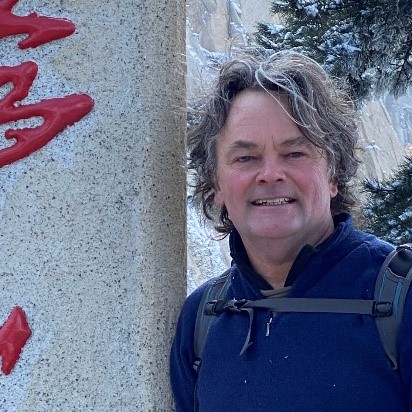 |
Dr. Dan Tormey is President of Catalyst Environmental Solutions Corporation, an environmental science and policy consultancy in the USA. He has a Ph.D. in Geology and Geochemistry from MIT and a B.S. in Civil Engineering and Geology from Stanford. Dr. Tormey has worked on behalf of IUCN in world heritage since 2009, having conducted 24 desktop reviews of nominations from States Parties to the World Heritage List, and one field mission. He has co-authored two guiding works for the International Union for the Conservation of Nature: World Heritage Volcanoes: Classification, gap analysis, and recommendations for future listings, published in 2019, and Best Practice Guidelines on Geoheritage Conservation in Protected Areas to be published in 2021. Dr. Tormey actively pursues volcanology research around the world in the USA, Italy, Armenia, Georgia, Indonesia, the Philippines, and more than 30 years in the Andes of South America. His research spans geology and geochemistry; interactions between geophysical variables that affect risk assessment, risk preparedness, and contingency planning; community outreach, education and communication; relations between geodiversity and biodiversity; and geoheritage. Dr. Tormey is an expert in environmental policy and environmental impact assessment of energy, water, and land management issues, including evolving strategies for climate change adaptation action plans. He was named by the National Academy of Sciences to the Science Advisory Board for Giant Sequoia National Monument; to the California Council on Science and Technology for issues related to hydraulic fracturing; is a Distinguished Lecturer and recipient of the award for Environmental and Social Responsibility for the Society of Petroleum Engineers; is the lead scientist for Cruz del Sur, emergency response and contingency planning organization in Chile; was an Executive in Residence at California Polytechnic University San Luis Obispo; is a Fellow of the Explorers Club, and is a Professional Geologist in California. |
Lecture #8 – The Establishment of China’s National Park System– A Case Study from Sanjiangyuan
September 25, 5:00-6:00pm Vancouver time (Sept 26, 8:00-9:00am, Beijing Time)
Keynote Speaker: Dr. Rui Yang, Professor, Tsinghua University, China
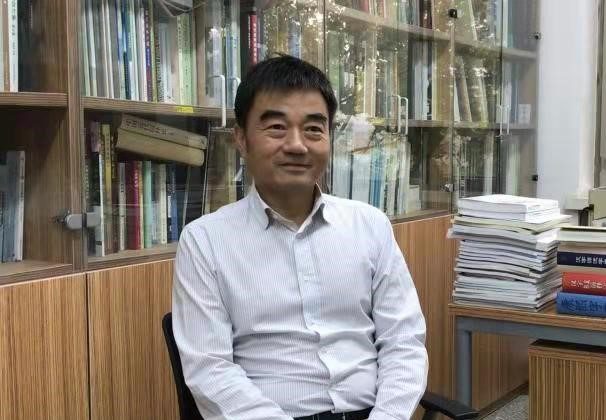 |
Dr. Rui Yang is the co-founder, head, and professor of the Department of Landscape Studies, School of Architecture, Tsinghua University, and Director of the National Park Research Institute of Tsinghua University and Vice Chairman of the Chinese Society of Landscape Architecture. He obtained his Bachelor, Master, and Doctor in Landscape Architecture from Tsinghua University. He was a Visiting Scholar in the Graduate School of Design at Harvard University. In 1998, he proposed to build a “Northwest Yunnan National Park and Protected Area System” and carried out many research projects in this area. In 2003, he put forward 4 strategies, 32-key guidelines, and 41 action plans to establish and improve China’s national parks systems, which are the foundation of the establishment of a national park system. He presided over 20 national parks and nature reserves’ planning and design, among which the Meili Snow Mountain Master Plan was awarded the first prize by the China Construction Science and Technology and the first prize of Excellent Landscape Architecture Planning and Design of the First Chinese Society of Landscape Architecture. As a leader of the expert group, he chaired the drafting committee of China’s first five-year plan for the protection of cultural and natural heritage. At present, he is invited to serve as an expert for many government departments such as the Ministry of Education, the National Development and Reform Commission, and the National Forestry and Grass Administration. |
Lecture #7: Looking back to move forward: Achievements and challenges of biodiversity conservation in Nepal
September 18, 7:00-8:00pm Vancouver time (Sept 19, 7:45-8:45am – Kathmandu Time; Sept 19, 10:00-11:00am Beijing Time)
Keynote Speaker: Dr. Ghana Shyam Gurung, Country Representative, WWF-Nepal
 |
Dr. Ghana Shyam Gurung is a country representative of WWF-Nepal. He completed his Ph.D. at the University of Zurich, Switzerland in Natural Science. He has over 20+ years of experience in species and people-centred conservation in Nepal. Dr. Ghana is one of the pioneers of initiating community-based conservation areas and landscape-level conservation in Nepal, which plays a key role in the conservation of iconic wildlife species (tigers, rhinos and snow leopards) and landscapes encompassing community-based institutions as local stewards of nature conservation. Throughout his career, he has been instrumental in formalizing transboundary cooperation with China and India for conservation and wildlife trade control. Recognizing his contribution to global snow leopard conservation, he has been recognized as the Snow Leopard Champion for the WWF Network.
A recent interview of Dr. Gurung in world atlas https://bit.ly/3i8mwDN |
Lecture #6: Managing Tongariro National Park Within the Context of COVID-19
September 11th, 5:00-6:00pm Vancouver Time (September 12th from 12:00 – 1:00pm New Zealand Time)
Keynote Speakers: Te Ngaehe Wanikau and Bubs Smith
 |
Te Ngaehe Wanikau is a high-level spiritual Maori leader. The Tongariro National Park is the first national park to be inscribed with dual world heritage status for its environmental landscape and cultural values. The Ngāti Hikairo ki Tongariro people are the guardian authority for the mountainous range and are a sub-tribe to the Ngāti Tuwharetoa people. Te Ngaehe is a researcher and advocate for liberal Māori educational pathways and also supports his tribe to mediate, negotiate, strategize and communicate to effect co-governance and co-management of their environment within his tribal district with Crown agencies. |
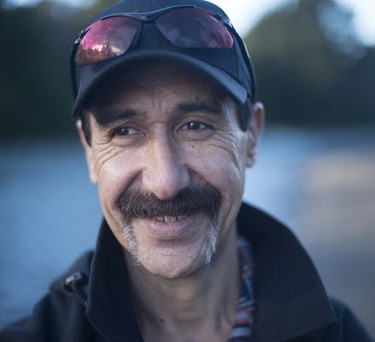 |
Bubs Smith works for Ngāti Tūwharetoa which is the Iwi that have lived in and around Lake Taupō and Tongariro National Park area for centuries. As kaitiaki (guardians) of these ancestral lands, Mr. Smith ensures the safety of manuhiri (visitors) engaging in activities within Tongariro National Park and the surrounding areas. Mr. Smith facilitates collaborative work to address the adequate preparation of visitors before entering this culturally and environmentally sensitive protected area. |
Lecture #5: Protected Area Management in Indonesia
September 4, 6:00-7:00pm Vancouver time (September 5, 8:00-9:00am Jakarta Time, and 9:00-10:00am Beijing Time)
Keynote Speaker: Prof. Dr. Rinekso Soekmadi, Bogor Agricultural University, Indonesia
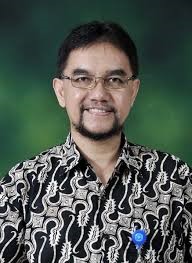 |
Prof. Dr. Rinekso Soekmadi is a professor in the Department of Forest Resources Conservation and Ecotourism, and former Dean of the Faculty of Forestry at Bogor Agricultural University. His professional focus is on protected area management. Prof. Rinekso earned his Master’s and Doctoral degrees from the University of Göttingen, Germany. Prof. Rinekso was elected as Head of the Forestry Science Program, Faculty of Forestry, IPB in 2002-2008. Rinekso then served as Director of Cooperation and International Programs of IPB from 2008 to 2013, Director of Student Affairs of IPB in 2013-2015. Rinekso is trusted as Dean of the Faculty of Forestry IPB 2015-2020. Prof. Rinekso has also proven his excellent work as a researcher in the field of conservation and area management. |
Lecture #4: National Park in the New Normal: Challenges and Opportunities of National park management in Vietnam
August 28, 5:00-6:00pm, Vancouver Time (August 29, 8:00-9:00am, Beijing Time)
Keynote Speaker: Prof. Dr. Hoang Van Sam, Vietnam National University of Forestry, Vietnam
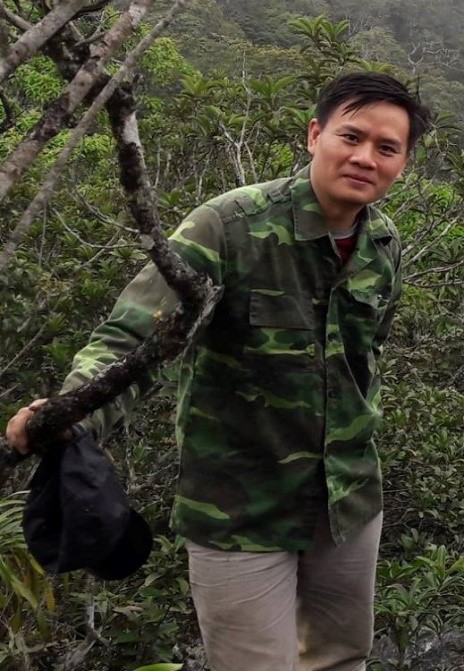 |
Prof. Dr. Hoang Van Sam is a professor, senior lecturer, researcher and director of the International Cooperation Department at Vietnam’s National University of Forestry. He graduated MSc and PhD in plant taxonomy and biodiversity conservation from Leiden University, in the Netherlands. His research expertise focuses on national parks and nature reserves in Vietnam. He is the author/co-author of more than 90 articles on plant taxonomy, biodiversity conservation, forest resources management. Prof. Sam has successfully lead18 research projects; acted as chair/co-chair for 10 international conferences; and supervised 10 PhD, 58 MSc and 62 BSc students in Vietnam, Laos and China. He has been invited to lecture and present on tropical plants, plant diversity, and biodiversity conservation at academic institutions in Vietnam, Germany, The Netherlands, Japan and USA. |
Lecture #3: Title: Covid-19 Challenges of Protected Areas Management in India: Towards Integrated Nature-Culture Solutions
August 21, 5:00-6:00pm, Vancouver Time (August 22, 8:00-9:00am, Beijing Time)
Keynote speaker: Prof. Dr. Ramesh Krishnamurthy, M.Sc., Ph.D. Scientist, Wildlife Institute of India (MoEFCC, Govt. of India), Dehradun, Uttarakhand, India
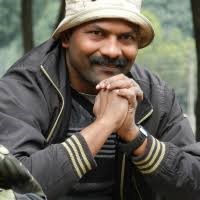 |
Dr. Ramesh Krishnamurthy is a scientist with the Wildlife Institute of India and is also an Adjunct Professor with the Faculty of Forestry, UBC. He specializes in Landscape Ecology, Species Recovery Strategies and Integration of Technology in Wildlife Research and Management. He serves on various commissions of IUCN and academic/conservation associations. His research and conservation experiences are mainly on birds and mammals of the Western Himalaya, Shivalik-Terai Landscape and Central India regions. Presently, he is involved in a diversity of projects that include the Reintroduction and Monitoring of Tiger Populations in Panna Tiger Reserve (Madhya Pradesh), Conservation Breeding and Reintroduction of Western Tragopan in Himachal Pradesh, Application of Wireless Sensor Networks for Forest and People Protection, Integration UAV (Drone) for wildlife research and management, and Climate Change Effects on Riverine Forests and Indicator Species along the Ganges. He has received the prestigious Distinguished Foreign Scholar Award by the US Regional Association of the International Association for Landscape Ecology and the NASA-MSU Professional Enhancement Award by the National Aeronautics and Space Administration, and Michigan State University, USA. |
Lecture #2: Biodiversity and protected areas of Latin America: challenges and future opportunities after Covid-19
August 14, 5:00-6:00pm, Vancouver Time (August 15, 8:00-9:00am, Beijing Time)
Keynote speaker: Prof. Cristian Bonacic (Department of Ecosystems & the Environment, School of Agriculture & Forestry Engineering, Pontificia Universidad Católica de Chile)
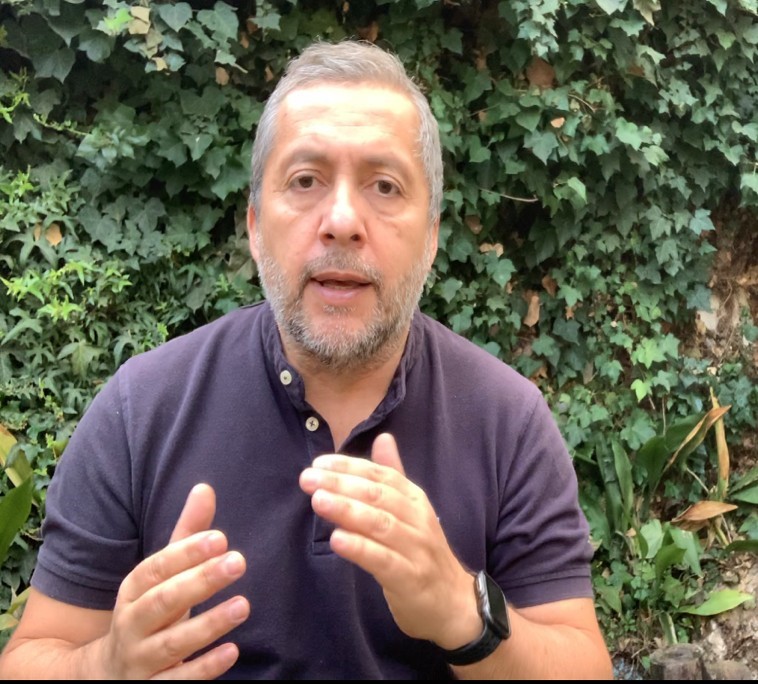 |
Dr. Cristian Bonacic graduated from the University of Oxford, UK and has worked at Pontificia Universidad Católica de Chile for 30 years, as Department Head in 2010 and 2016. He has received national and international prizes like the Lama Medicine Award from South American Camelids specialists by the American Veterinarians association, and also, an Award for his contribution to Science (2017) by the Chilean DVM Board and the Whitley Commendation Award by HRH Princess Anne in The United Kingdom (2007). He’s a visiting professor at the Nelson Institute of The University of Wisconsin, funded by a Tinker Fellowship in 2015. His research interests and collaborations have included wildlife management inside protected areas, wildlife conservation, sustainable use of wildlife and local communities.
His current research also includes the role of protected areas in Latin America to conserve jaguars (Panthera onca) and Mountain lion (Puma concolor). This project seeks to provide recommendations to combine sustainable livestock production (Sustainable Development Goals 2) and biodiversity conservation (SDG 15), funded by Latin American Observatory of The UN Sustainable Development Goals. |
Lecture #1: National Park in the New Normal: Challenges and Opportunities from Canadian Perspectives
August 7, 5:00-6:00pm Vancouver time (August 8, 8:00-9:00am, Beijing time)
Chair: Dr. Guangyu Wang, Director of National Park Research Centre
Keynote Speaker: Dr. Harvey Locke
 |
Dr. Harvey Locke is a conservationist, writer, and photographer who is a recognized global leader in the field of parks, wilderness and large landscape conservation based in Banff. He is co-founder of both the Yellowstone to Yukon Conservation Initiative and the global Nature Needs Half Movement and serves as Chair of the IUCN World Commission on Protected Areas Beyond the Aichi Targets Task Force. Named one of Canada’s leaders for the 21st century by Time Magazine, Harvey received the Fred M. Packard International Parks Merit Award at the IUCN World Parks Congress in Australia. Since 2018 he has been very active in China including serving as an expert member of the China Council for International Cooperation on Environment and Development’s Special Policy Studies group for the Convention on Biological Diversity and working with members of the Chinese Academy of Sciences and the Ministry of Environment and Ecology. |


























